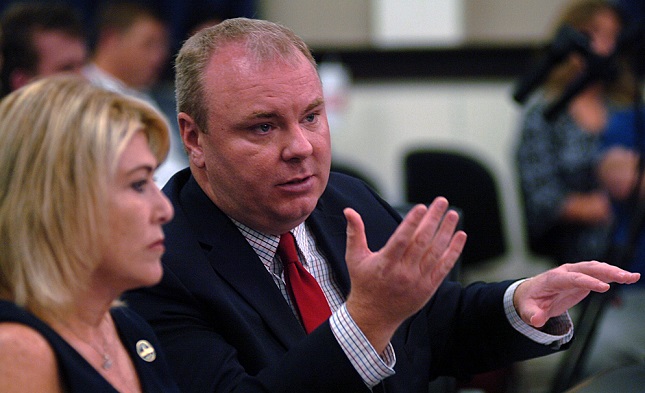FRANKFORT, KY – Whether legalizing medical marijuana is the right prescription for Kentucky was pondered Friday by a state legislative panel.

Rep. Jason Nemes, R-Louisville, presenting proposed legislation on medical marijuana alongside Rep. Diane St. Onge, R-Fort Wright.
“I know medical cannabis can help some folks,” said Rep. Jason Nemes, R-Louisville, while testifying before the Interim Joint Committee on Licensing, Occupations & Administrative Regulations. “I say that as someone who has never done any illegal drug. I say that as someone who tries to follow every law, even speeding limits. I would break the law willingly if it would help myself, my wife or my children.
“And if I would do it, it ought not to be illegal for our neighbors.”
He testified alongside Rep. Diane St. Onge, R-Fort Wright, on proposed legislation to legalize medical marijuana. The two stressed that they strongly opposed any legislation that might lead to the legalization of recreational marijuana.
St. Onge said the proposal would not specify what ailments would be legal to treat with marijuana.
“We are not doctors,” she said, “and we feel it is best left to our physicians to recommend in their confidential patient-doctor relationship what they feel might help alleviate some of the pain or some of the symptoms. Marijuana is not a cure that we know of to date. It is used for palliative effects. We believe that is best left to our physicians.”
Senate Majority Floor Leader Damon Thayer, R-Georgetown, applauded the fact Nemes and St. Onge said the proposal wasn’t an effort to raise money for the general fund as others have proposed.
“I think advocates for medicinal marijuana need to stop saying this is going to solve our pension problems,” Thayer said. “It is a false promise. We don’t tax pharmaceuticals in this state so why, if we passed medicinal marijuana, would we tax it? It is unfair.”
Thayer said he was against a provision in the proposal that would allow people to grow their own medical marijuana. He expressed skepticism that regulators could prevent homegrown marijuana from being diverted for illegal use.
St. Onge said she now supports a home-grow provision because it accommodates low-income residents unable to afford marijuana dispensaries or rural residents in counties with no dispensaries. St. Onge said the provision would also further discourage the illegal growing and selling of marijuana to medical patients.
Nemes said medical marijuana would be regulated by a new state agency called the Department of Cannabis Administration. He said any violations of the provisions of the proposed medical marijuana law would be a criminal offense.
“It will be their job to make sure the doctors are doing what they need to do and not overprescribing,” Nemes said. “We don’t want any marijuana mills like we have had pill mills.”
Registered users couldn’t smoke medical marijuana in public places, Nemes said. He added that landlords could also prohibit home growing of medical marijuana.
The proposal would discourage medical marijuana “vacationing” by restricting the sale of cannabis to out-of-state residents. Nemes said the proposed legislation is about helping the chronically and critically ill.
“I understand there is opposition to this,’ Nemes said. “ There is good-faith opposition to this. There is legitimate opposition to this. I was against this concept when I ran for office. I respect those who disagree with me today.”
Interim Committee Co-Chair Rep. Adam Koenig, R-Erlanger, asked if employers could fire employees for testing positive for marijuana use.
St. Onge said employers couldn’t discriminate against job applicants approved by a doctor to use medical marijuana. She said the employer could prohibit the use of medical marijuana on their premises. Nemes added that employers could also prohibit employees operating heavy machinery from using marijuana.
Rep. Al Gentry, D-Louisville, said he supported medical marijuana but asked about the legal liability of employing people using medical marijuana. Nemes said the proposal included suggestions from the Kentucky Chamber of Commerce designed to shield employers from those employees’ actions.
Rep. Kimberly Poor Moser, R-Taylor Mill, asked what it would cost to establish and operate the Department of Cannabis Administration. Nemes said it would be paid for by a licensing fee on medical marijuana businesses. The proposal calls for the fee to be set at a percent of the gross receipts for each business.
Rep. Susan Westrom, D-Lexington, said legalizing some form of marijuana has been a perennial issue during the nearly two decades she has been in the state legislature. She said that has given her an abundant amount of time to study the issue including visiting California and Colorado dispensaries and the doctors prescribing marijuana instead of opioids.
“I didn’t realize the science had become so perfected that you really could treat specific diagnoses,” Westrom said. “There is something very positive about medical marijuana. I think there are a lot of people here who could benefit from this. I just wish we could have some oncologists who could come in and discuss this.”
Senate Majority Caucus Chair Dan “Malano” Seum, R-Fairdale, said he has had several doctors tell him they wished they could recommend marijuana as another tool to treat patients. He added that there was at least one oncologist nurse in the audience.
“I am a cancer survivor,” Seum said. “I’ll tell you point-blank if you get nausea after cancer surgery ... you will be smoking a joint from here to that damn wall if it would take that damn nausea away from you – and I did just that.”
Rep. C. Wesley Morgan, R-Richmond, said he supported the proposal even though he will not be returning for the next session of the General Assembly to vote.
“I will tell you over the last 50 years we have probably spent $40 trillion trying to enforce the drug laws,” he said, “and frankly, we have not succeeded. And that’s a fact.”
Sen. John Schickel, R-Union, who chaired the meeting, said opponents of legalizing medical marijuana in Kentucky are scheduled to testify at the interim committee’s next meeting on Sept 14.
-- END --











